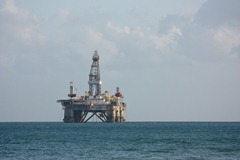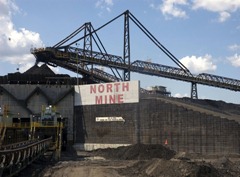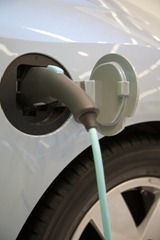Peak Oil Gets Dirty
 A recent article by oil industry consultant Michael J. Lynch in the New York Times concluded that the Administration’s meager eight-billion dollars of subsidies for renewable energy initiatives included “all sorts of unproven, unrealistic and inefficient energy technologies like wind farms and electric cars.” Peak oil is a myth, Lynch says. He and his ilk hold that there’s plenty of oil, and we won’t run out of it for a couple of centuries. Not to worry.
A recent article by oil industry consultant Michael J. Lynch in the New York Times concluded that the Administration’s meager eight-billion dollars of subsidies for renewable energy initiatives included “all sorts of unproven, unrealistic and inefficient energy technologies like wind farms and electric cars.” Peak oil is a myth, Lynch says. He and his ilk hold that there’s plenty of oil, and we won’t run out of it for a couple of centuries. Not to worry.
The concept of "peak oil" views that as oil is an exhaustible resource that we will run out of relatively soon. The more radical side of the peak oil debate says the world already passed its peak of production in 2006. More generous estimates put off the year we produce the most oil until 2020. It’s a fact that oil production in the U.S. peaked back in 1970, and is still going down.
At the same time, we keep using more of the stuff: in the decade between 1995 and 2005, we increased our daily use of oil by 15 per cent, to 20,700,000 barrels every one of 365 days of that year. Demand in the rest of the world went up even faster.
 The not-to-worry group tends to pass over the fact that the oil we use and the oil that remains to be piped into the world economy is increasingly hard to get. It is miles under the sea or mixed up with other materials — as it is in Canada’s tar sands. High oil prices will support the hard-to-get sources economically, but hard-to-get oil has ecological costs that will not be so easy to cover. The BP oil spill in the gulf last year is one example. The vast tracts of Canadian forest that will be destroyed, the two barrels of water that are needed to clean every barrel of tar sands oil, and the toxic sludge that is already leaching into Canadian waters are others.
The not-to-worry group tends to pass over the fact that the oil we use and the oil that remains to be piped into the world economy is increasingly hard to get. It is miles under the sea or mixed up with other materials — as it is in Canada’s tar sands. High oil prices will support the hard-to-get sources economically, but hard-to-get oil has ecological costs that will not be so easy to cover. The BP oil spill in the gulf last year is one example. The vast tracts of Canadian forest that will be destroyed, the two barrels of water that are needed to clean every barrel of tar sands oil, and the toxic sludge that is already leaching into Canadian waters are others.
Defenders of oil-aplenty are losing ground as more and more countries take steps to free themselves from the encumbrance of oil. Germany now receives some 20 per cent of its energy from such “unrealistic and inefficient” renewable energy sources as wind, water and, especially, solar power. The Germans have developed this capability by just such subsidies as Mr. Lynch belittles, and have an economy and employment greatly enhanced by those investments. We, on the other hand provide our fossil fuel companies with tax breaks, allowances, government services and direct subsidies that in total dwarf the cited Administration’s efforts to support renewable energy development.
Our fossil fuel producers have spent the last 80 years making sure we remain dependent on them. Back in the Thirties and Forties, GM and Standard Oil, among others, bought up and dismantled almost to the last car an electric train and trolley system that cast its low-cost, environmentally clean net across America, from coast to coast.
 In another instance, Chevron bought up and sequestered the patents for the first successful battery capable of powering electric cars, keeping it from being produced. The latter was Chevron’s 1992 purchase and subsequent withdrawal of the rights to the T95 nickel-metal hydride battery, which still powers a few surviving 1992 and 1993 Toyota RAV4’s with a 150-mile range some 15 years later – 50 miles more than current electric car batteries can muster.
In another instance, Chevron bought up and sequestered the patents for the first successful battery capable of powering electric cars, keeping it from being produced. The latter was Chevron’s 1992 purchase and subsequent withdrawal of the rights to the T95 nickel-metal hydride battery, which still powers a few surviving 1992 and 1993 Toyota RAV4’s with a 150-mile range some 15 years later – 50 miles more than current electric car batteries can muster.
The fossil fuel companies, and especially oil, have the money to make their case a hundred times a day on television and other media, extolling their cleanliness and good citizenship, but it’s not really true. Yes, the companies are engaged in solar power and wind energy projects, but it’s a small part of their business. Shell Canada and Halliburton among others are not working the Athabasca oil sands with clean energy in mind. We will be cleaning up after them, at our expense, for centuries to come.
It does not matter whether we run out of oil in forty years or in a hundred. The extraction and burning of all fossil fuels, including oil, is a dirty business in every way. Most importantly, burning fossil fuels releases the carbon that was taken out of the atmosphere by plants as they lived, died and were buried over millions of years. As we recarbonize our air, the clean and temperate atmosphere that took millennia to create becomes polluted, creating ill health and bringing us the consequence of climate change.
Every eight minutes, the sun pours enough energy onto the earth to run our modern civilization. The wind blows uncounted joules of energy across the earth. The rivers and oceans pour power wherever they run and break. The earth generates its own heat not far beneath its surface. Nothing but our failure to look forward prevents us from harnessing these powers and moving toward freedom from the tyranny of the countries and companies that produce fossil fuels, and thereby control our future. Yes, we will need oil, coal and gas for a long time to come, but that does not mean that we should not work to create efficient ways of using renewable energy as soon as we can. Denigrating clean energy sources as “not ready for prime time,” may serve the oil companies’ bottom line, but not the best interests of the rest of us.


